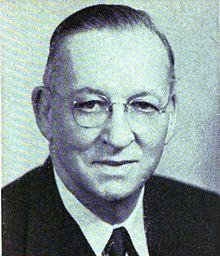Get Today in Masonic History into your Inbox. Sign up today for one of our email lists!
Need an article for your Trestleboard/Newsletter see our Use Policy
Clarence J. Brown, Sr. is Born

Today in Masonic History Clarence J. Brown, Sr. is born in 1893.
Clarence J. Brown, Sr. was an American politician and publisher.
Brown was born either in Blanchester, Ohio or in West Union, Ohio. His middle name is actually "J" and does not stand for anything. He would attend Blanchester public schools. In 1913, he would attend Washington and Lee University in Lexington, Virgina, graduating in 1915.
In 1917, Brown began working in newspapers in Blanchester. He would publish several country newspapers. He would become the president of Brown Publishing Company and would guide the company until his passing. He also owned and operated several large farms in the area.
In 1918, at the age of 25, Brown was elected as the 36th Lieutenant Governor of Ohio. He would serve from 1919 to 1923. He would be the youngest person elected to the position. In 1926, he would be elected as the Ohio Secretary of State serving from 1927 to 1933. He would also run twice for the office of Governor. He was defeated both times, once in the primaries and the other in the general election.
In 1938, Brown would be elected to the United States House of Representatives from Ohio as a Republican. He would serve in the House until the time of his passing. Brown was an isolationist and opposed Franklin D. Roosevelt's policies. After Truman was elected he opposed the Fair Deal policies of Truman's Presidency.
In the late 1950's and 1960's, Brown was on the Rules Committee for the House of Representatives. As the senior minority member on the committee, Brown aligned himself with Democrat and chairman of the committee Howard W. Smith. Smith and Brown blocked the liberal legislation put forward by Kennedy and Johnson including Civil Rights legislation. Near the end of his life, Brown changed course and checked himself out of the hospital to return to the Rules committee and shepherd the Voting Rights Act of 1965 through the committee. Brown also contributed to other other achievements of the Civil Rights era.
Brown passed away on August 23rd, 1965.
This article provided by Brother Eric C. Steele.

